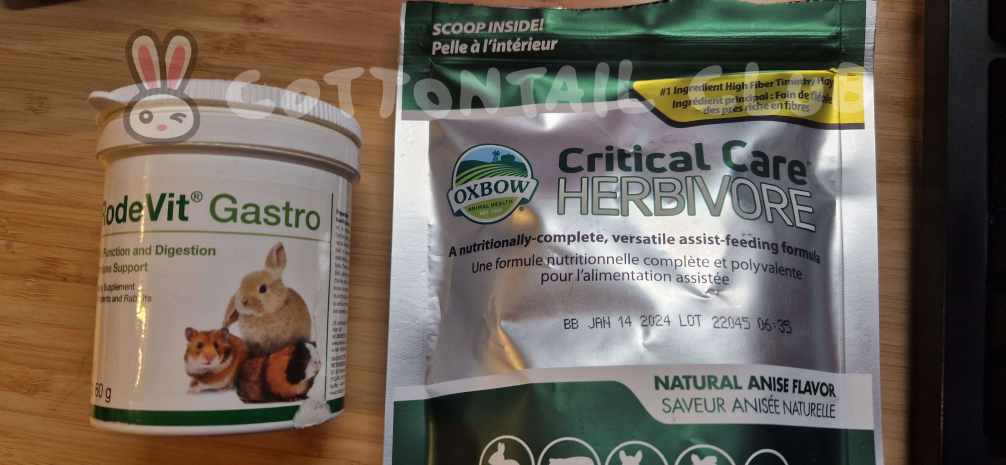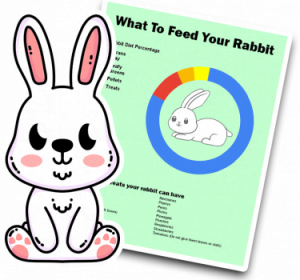
Rabbits are prone to health issues, some of which can be life-threatening, and it doesn’t necessarily mean you’ve done anything wrong. When your rabbit is poorly or in pain, they usually won’t show it verbally, it’s likely to be body language or behavioral.
In this article, we will discuss critical care for rabbits, including how to identify emergency situations, what to do, and how to prevent such situations from happening.

Critical care is considered the magic medicine for rabbits. It’s a powdered solution that provides your rabbit with calories and hydration via a syringe feed method. You should always have critical care available (We recommend Oxbow) if your rabbit’s gut needs stimulation and you cannot access your veterinarian.
Making Critical Care is extremely easy; mix the powder with clean water until it becomes a smooth paste. This may require constant mixing to smooth the mixture as best as possible, lowering the chances of choking.
In most cases, your rabbit must be given Critical care during GI Stasis and after surgery. If you’re unsure, call and ask your local veterinarian.
We also use RodeVit as a Rabbit Probiotic, but this should be given regularly if your rabbit has issues with their gut and is not a replacement for Critical Care.
When giving critical care to rabbits, you should act quickly if you notice any signs of an emergency. As mentioned earlier, some of the signs that your rabbit may be experiencing a critical care situation include:
If your rabbit exhibits any of these symptoms, seek veterinary care immediately. Rabbits are fragile animals, and their health can deteriorate quickly, so time is of the essence.
If you’re unsure whether your rabbit is experiencing a critical care situation, it’s always better to err on the side of caution and seek veterinary care.
If your veterinarian recommends that you give critical care to your rabbit at home, you can prepare the Critical Care solution yourself.
Instructions will usually be on the back of the Critical Care packaging. However, if you don’t have those to hand, we have attached an image of the Oxbow Critical Care solution.

This isn’t the optimal route and should only be done if you have no alternatives. Critical Care for Rabbits is a high-fiber, high-protein, and nutrient-dense formula that is easy to digest. This is the DIY recipe. If you’re missing anything, don’t worry. Just use what you can.
Blend all the ingredients in a blender or food processor until it becomes a smooth paste. You can administer the critical care formula using a syringe or a feeding tube.
The amount of critical care to give your rabbit depends on its weight and the severity of its condition. Your veterinarian will be able to provide you with specific instructions on how much critical care to give your rabbit and how often to administer it.
Generally, critical care for rabbits is given in small amounts, typically 10-20ml at a time, every few hours. The amount and frequency of critical care administration will depend on your rabbit’s needs, and your veterinarian may adjust the dosage based on your rabbit’s response to treatment.
If your rabbit cannot swallow or is struggling to breathe, do not attempt to give it critical care at home. Seek veterinary care immediately, as your rabbit may require emergency intervention.
Here is a table that calculates, based on your rabbit’s weight how much formula they should have per 24 hours:
| Rabbit Weight | Daily Formula (mL) | Daily Formula (tbsp) |
|---|---|---|
| 2lbs (0.9 kg) | 45 mL | 6 tbsp |
| 3lbs (1.3 kg) | 68 mL | 9 tbsp |
| 4 lbs (1.8 kg) | 90 mL | 12 tbsp |
| 5 lbs (2.2 kg) | 113 mL | 15 tbsp |
| 6 lbs (2.7 kg) | 135 mL | 18 tbsp |
| 7 lbs (3.17 kg) | 158 mL | 21 tbsp |
| 8 lbs (3.6 kg) | 180 mL | 24 tbsp |
| 9 lbs (4 kg) | 203 mL | 27 tbsp |
| 10 lbs (4.5 kg) | 225 mL | 30 tbsp |
This can be incredibly difficult, especially if your bunny isn’t used to being handled. We recommend wrapping them like a burrito during this process, and it can make the task much easier as they cannot struggle as much.
If you need to syringe feed your rabbit critical care at home, it’s essential to do it correctly to ensure your rabbit receives the nutrition without causing harm or discomfort. Here’s how to syringe feed your rabbit:
It’s important to note that syringe feeding should be done under the guidance of a veterinarian. Your veterinarian can provide specific instructions on how much critical care to give, how often to administer it, and how to monitor your rabbit’s response.
If you’re unsure how to syringe feed your rabbit, or if your rabbit is not responding to treatment, seek veterinary care immediately.
Yes, you can, but it is highly recommended to do this under a veterinarian’s recommendation, even via a phone call. Critical care should only be administered if your rabbit needs it.
Yes, rabbits can recover from critical care situations with proper care and attention. However, the success of the recovery depends on the severity of the situation and the quality of the veterinary care provided.
You should call the veterinarian practice that performed the procedure as your rabbit may not be eager to eat due to pain, nausea from the operation, or being uncomfortable.

By entering your email address you agree to receive emails from Cottontailclub. We'll respect your privacy and you can unsubscribe at any time.